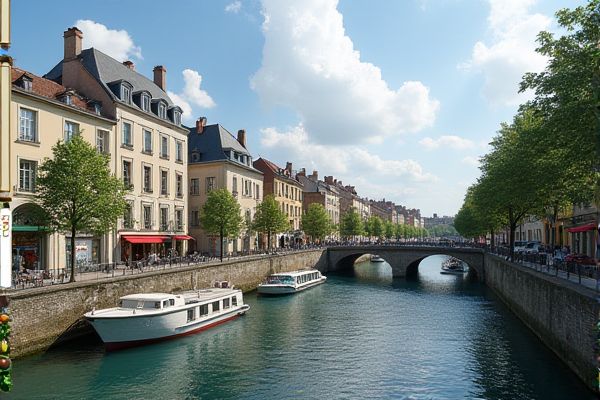
Safety and crime rates in France: Overall low violent crime rates. Pickpocketing common in tourist areas. Safe neighborhoods vary by city. Strong police presence in urban areas. Emergency number is 112. Terrorism threat level is moderate. Frequent national security updates. Public transport is generally safe. Nighttime caution advised in urban centers. Secure personal belongings at all times.
Overall low violent crime rates.
France has overall low violent crime rates, with an intentional homicide rate of 1.14 incidents per 100,000 inhabitants in 2021, and a general decrease in property crimes such as theft over the past years. For more detailed statistics and insights into Crime In France, you can visit the Statista website. This positive trend reflects ongoing efforts to enhance public safety and implement effective crime reduction strategies.
Pickpocketing common in tourist areas.
Pickpocketing is a significant issue in Paris, particularly in tourist areas such as the Eiffel Tower, Montmartre, the Latin Quarter, and popular museums like the Louvre and Musee d'Orsay. Thieves often operate in crowded places, including public transportation and department stores, using distraction techniques and working in organized gangs. To learn more about how to protect yourself when visiting the City of Lights, you can explore resources from Offbeat France, which offers valuable insights and advice on staying vigilant and safe. Awareness and precaution are key to ensuring a secure and enjoyable experience while exploring the treasures of Paris.
Safe neighborhoods vary by city.
In Paris, the safest neighborhoods are often found in the outer arrondissements, such as the 14th, 15th, and 20th, which have lower rates of violent theft, burglary, and assault compared to the central areas. However, even within safe arrondissements, some specific neighborhoods may have higher crime rates, emphasizing the need to research and visit areas before committing to a long-term rental. For more detailed information on safe neighborhoods, visit the International Citizens website. Proper planning and precaution can significantly enhance your experience of living in this iconic city.
Strong police presence in urban areas.
France is maintaining a strong police presence in urban areas, particularly in Paris, following the 2024 Olympics, with continued implementation of the "zero crime plan" that has led to significant reductions in burglaries, thefts, and violent crimes through increased police presence and community policing strategies. This approach has resulted in drops in crime rates, such as a decrease in burglaries and a decrease in violent theft on transport systems during the Olympic period. More information on these measures and their impact can be found on the Olympic Heavy Police Presence website.
Emergency number is 112.
In France, the pan-European emergency number 112 can be dialed from any phone for all emergency situations, and it is free of charge. Additionally, specific emergency numbers are available for different services: 17 is used to contact the police, 15 connects you with medical aid services known as SAMU, and 18 is the number for the fire service. For more detailed information on these critical emergency contacts, you can visit the comprehensive guide on The Good Life France website.
Terrorism threat level is moderate.
France has raised its terror alert to the highest level, "attack emergency," due to the Islamic State's claim of responsibility for a deadly attack in Moscow and the perceived threats to the country, especially with the upcoming Paris Olympics and Paralympics. This measure includes increased patrols by armed forces in public places to enhance security.
Frequent national security updates.
In France, there is a high degree of caution advised due to the elevated threat of terrorism, with frequent national security updates including a 3-level public alert system under the Vigipirate plan, currently at the highest level "urgence attentat" ("attack emergency"). Enhanced security measures such as Operation Sentinelle and temporary border controls are also in effect. For more detailed information on safety protocols and travel advisories, visit the official website of the Government of Canada's travel section on France.
Public transport is generally safe.
Public transport in France, such as buses and coaches, is generally safe, with low mortality and fatal accident rates. Notably, during the 2012-2019 period, urban public transport systems demonstrated exceptional safety records. A comprehensive analysis and report, which can be accessed through the French Ministry of Ecological Transition, provide detailed insights into these safety metrics, emphasizing the robustness of public transport systems across various regions in France.
Nighttime caution advised in urban centers.
In France, nighttime caution is particularly advised in urban centers such as Marseille, Nice, and Paris, where areas like the city centers and tourist hotspots experience higher rates of petty theft, pickpocketing, and other crimes, with low perceived safety scores when walking alone at night. For a deeper dive into the safety dynamics of these locations, visiting the resource on Dangerous Cities in France provides valuable insights.
Secure personal belongings at all times.
To secure your personal belongings in France, it is advisable to keep your passport, credit cards, and other valuables in separate bags or pockets. Carrying your bag across your body and keeping belongings close in restaurants and bars can also enhance safety. Ensure you avoid leaving valuables in your vehicle and exercise caution around tourist attractions and ATMs to reduce the risk of theft. For more information and guidance, you can visit the UK Government's Foreign Travel Advice on the safety and security in France.
